If you’re wandering down Avenida de Mayo heading west, you will eventually land at the steps of one of Buenos Aires’ most striking landmarks: the Palace of the Argentine National Congress, also known as Palacio del Congreso.
With its imposing neoclassical columns, massive bronze-plated dome, and granite exterior, it’s quite the sight to behold. But did you know you can also go inside, and that it is free to visit?
That’s right! The National Congress of Argentina offers free guided tours that let you step behind the grand doors and explore one of the country’s most important buildings.
Whether you’re interested in politics, architecture, or simply love a good behind-the-scenes experience, this is a fascinating stop to add to your Buenos Aires itinerary.
It took me about 3 attempts to finally tour the Argentine National Congress, and this is because tours cannot take place when there is parliamentary activity. So there’s a bit of luck involved, but I also learned a lot about the booking process during my failed attempts!
So here’s everything you need to know about visiting the National Congress, including how to book your tour, what you’ll see inside, and some handy tips for making the most of your visit.
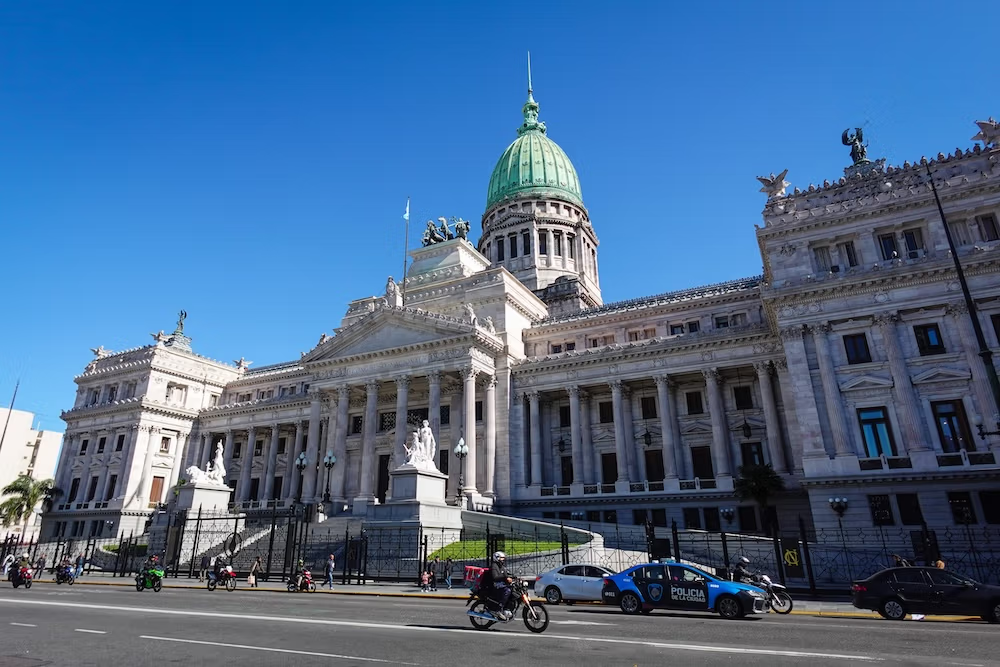
A Brief History of the National Congress
The idea of building a monumental legislative palace came at a time when Argentina was emerging as one of the world’s fastest-growing economies.
Construction began in 1897, at the height of the country’s Belle Époque, when Buenos Aires was striving to position itself as the “Paris of South America.”
The project was designed by Italian architect Vittorio Meano, the same mind behind the Teatro Colón. His vision drew heavily on neoclassical European architecture, with a commanding façade, elegant Corinthian columns, and a central dome rising 80 meters high.
The building was inaugurated in 1906, though work continued for several decades afterward to complete the interiors.
Today, the Palacio del Congreso houses both chambers of the legislature: the Chamber of Deputies (lower house) and the Senate (upper house).
Over its 100+ years, it has been the setting for pivotal moments in Argentina’s political life, from the passage of major laws to protests and demonstrations that frequently unfold in the square outside (hence the gates you’ll notice around Plaza del Congreso).
| Category | Details |
|---|---|
| 📍 Location | Av. Rivadavia 1864, Plaza del Congreso, Buenos Aires |
| 🕒 Tour Schedule | Weekdays, subject to parliamentary schedule. Check official site. |
| 💰 Cost | Free |
| 📝 Booking | In person and bring photo ID |
| ⏱ Tour Duration | 45–60 minutes |
| 🌐 Languages | Spanish and English |
| 🪪 Requirements | Passport or DNI for entry, early arrival for security |
How to Get to the National Congress
The Argentine National Congress sits on the western end of Avenida de Mayo, the historic boulevard that links it with Plaza de Mayo and the Casa Rosada (the Presidential Palace) on the eastern end.
- Subte: Take subway Line A to Congreso station and you’ll see the building right outside the exit.
- Bus: Numerous colectivos (buses) stop in and around Plaza del Congreso.
- On foot: If you’re exploring central Buenos Aires, it’s an easy and beautiful walk down Avenida de Mayo from Plaza de Mayo (about 15–20 minutes).
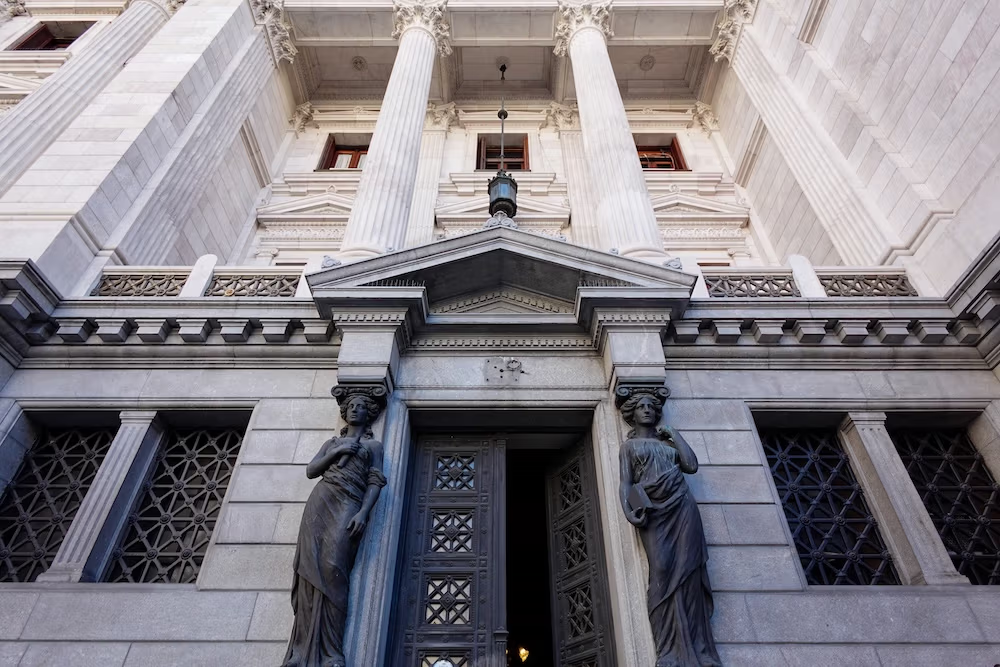
How to Book a Tour of Congress
The best part about booking a tour of Argentina’s National Congress, is that the tours are free!
Here’s how it works:
Guided tours run Monday to Friday at 12:00 and 17:00 if you go via the Senate. And they run Monday, Tuesday, Thursday, Friday at 11:00 and 17:00 in Spanish, and at 13:00 and 15:00 in Spanish and English if you go via the Deputies. Tours offered via the Senate and Deputies are exactly the same.
Now, that I’ve told you the schedule, I’m going to throw a curveball and let you know that these time slots can and will be cancelled at the very last minute due activity in parliament! You need to be flexible and prepared for plans to change at the drop of a hat.
In order to find a scheduled tour, you need to visit the official Senate website. Then, scroll down the homepage to the Agenda de Actividades (Activities Agenda), where you’ll want to find a Visita guiada al Palacio Legislativo (Guided visit of the Legislative Palace).
You’ll be able to see on what dates these guided tours are scheduled, and you’ll want to double check the day before you go to make sure the tour has not been cancelled!
Then, you’ll arrive at the National Congress building and make your way to Hipólito Yrigoyen 1863 (it is the third door on the south side of the congress building.)
You will want to arrive 30 minutes before the tour’s scheduled start time. A maximum of 30 guests can join these guided visits, and you cannot reserve a spot in advance. It’s first come, first served!
You can also book this exact same tour through the official Diputados website and follow the same steps. The only difference is that their entrance is on the north side of the building at Avenida Rivadavia 1864.
Shortly before the start of the tour, guests will be divided into Spanish and English-language tours. You’ll then make your way through security and enter the building with your assigned guide.
Note that some days only include a guided visit of the Legislative Palace, while other days also include the Parliamentary Museum. We did not get to see the museum on the day of our visit.
IMPORTANT: Bring your passport or DNI as identification is required in order to enter the building. You will also need to pass through airport-style security before the tour.
What You’ll See on the Tour of Congress
Stepping inside the Palace of the Argentine National Congress feels grand. It is an architectural work of art made up of grand marble staircases, echoing halls, and salons filled with chandeliers.
Here are some of the spaces you can expect to visit, keeping in mind that some of these salons may be skipped if in use:
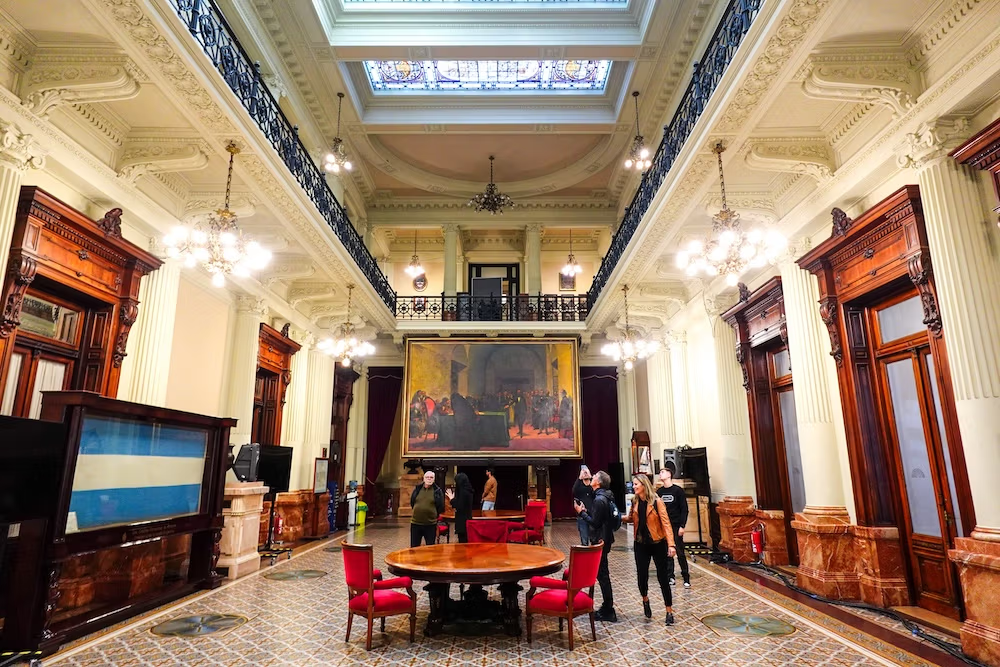
Hall of Lost Steps
The Hall of Lost Steps, or Salón de Pasos Perdidos, is a grand hall that acts as the antechamber to the Chamber of Deputies. It houses stained-glass windows on the ceiling depicting agriculture, justice, science, the arts, and commerce.
This rooms holds two important paintings. You can see Los Constituyentes del ‘53 by Antonio Alice, which portrays the members of the 1853 Constituent Congress, a pivotal moment in Argentine history when the constitution was drafted and proclaimed.
You can also see El Presidente Roca inaugura el periodo legislativo del año 1886 by Juan Manuel Blanes, depicting Argentine President Julio A. Roca giving his speech at the opening of the legislative session in 1886.
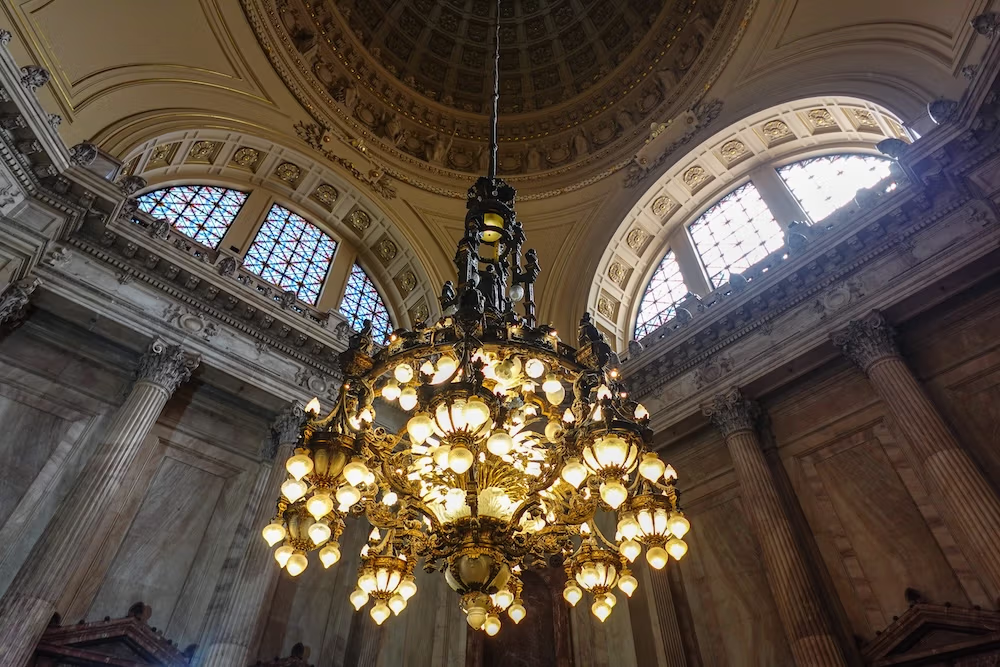
Salón Azul (The Blue Room)
Salón Libertador General San Martín is often referred to as the Salón Azul or Blue Room due to the color of its curtains and original furniture.
It is an octagonal space located in the center of the building and it forms the base of the imposing dome seen from the outside. It has an enormous bronze chandelier with 331 lights and Baccarat crystal lampshades.
This room is used for press conferences, official ceremonies, and state visits. It’s easily one of the most beautiful rooms in the Palace of the Argentine National Congress.
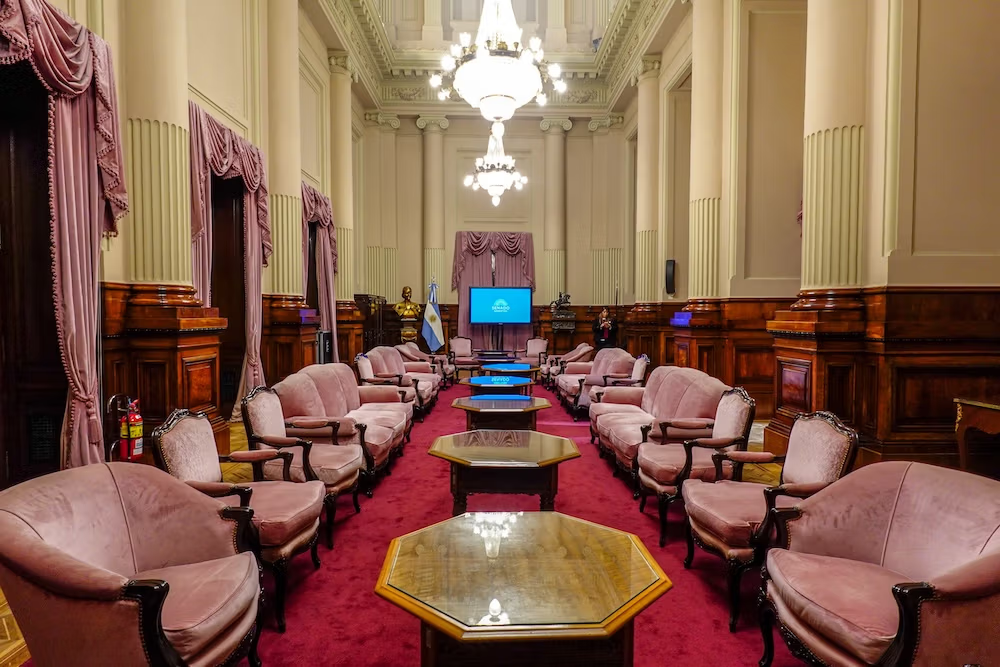
Salón Rosado (The Pink Room)
This pink-toned salon that was opened by Eva Perón to create a space where female politicians could convene separately from the male chambers.
Up until 1951, the Pink Room is where women met to discuss policies, and then, their notes would get passed on to a male deputy!
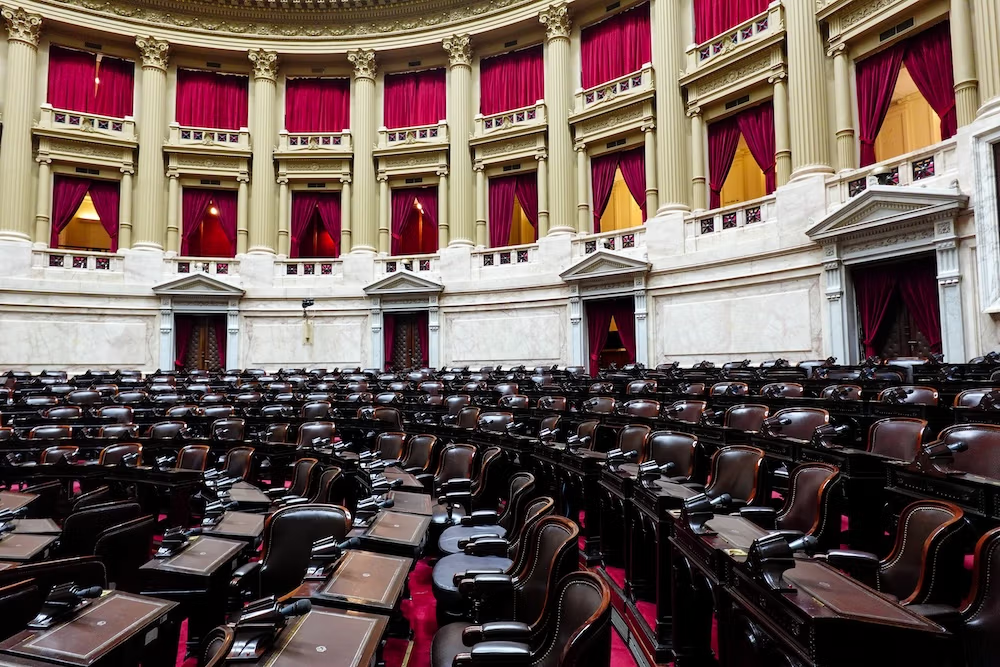
Chamber of Deputies
The legislative sessions of the Lower House are held in the Chamber of Deputies or Cámara de Diputados. It consists of 257 benches arranged in the shape of a semi-circle.
The chamber has three floors of galleries and is crowned by a stained-glass window with the national coat of arms.
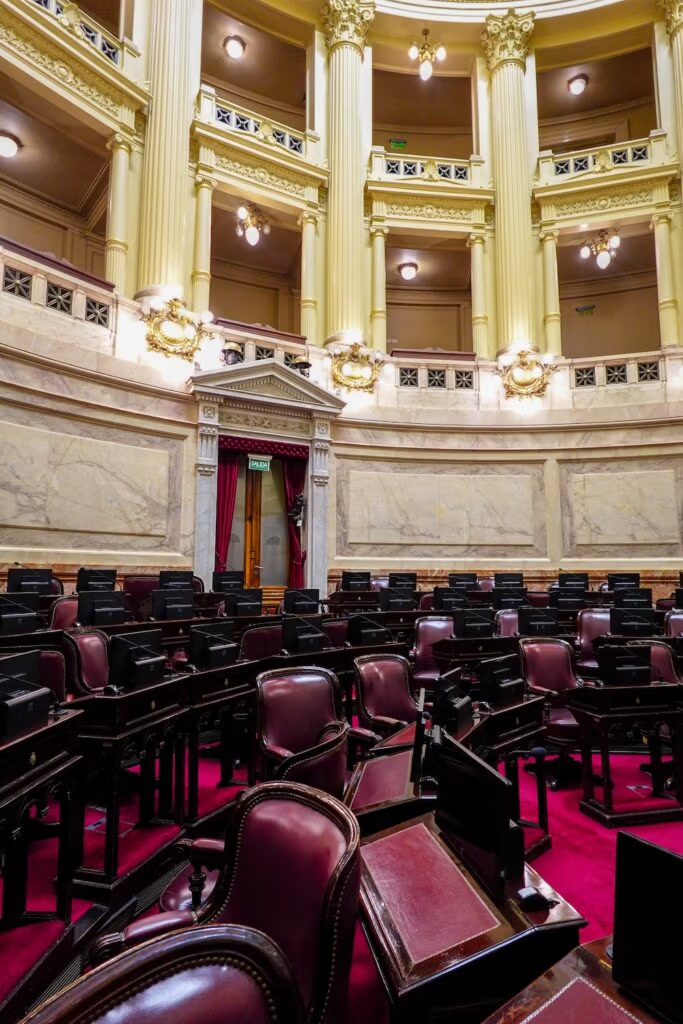
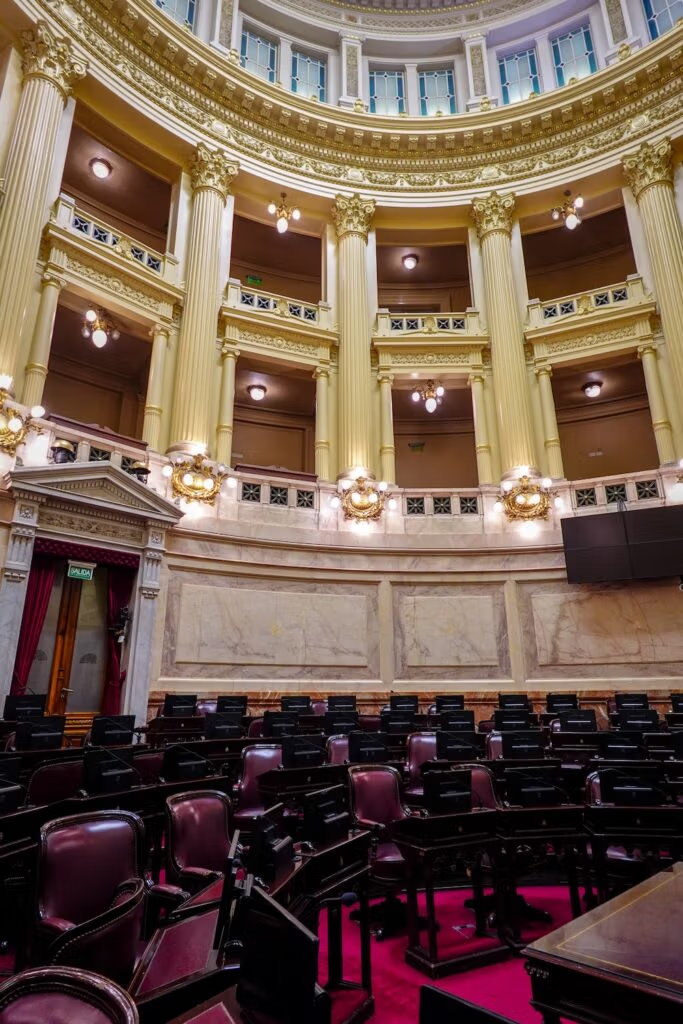
Senate Chamber
Located on the opposite side of the building, the Senate Chamber, or Cámara de Senadores, mirrors the grandeur of the Deputies’ chamber but on a smaller scale.
The chamber where the senators meet consists of 72 benches arranged in a semi-circle.
It has two floors of galleries for special guests and the press.
Salón Arturo Illia
The Arturo Umberto Illia Reading Room has historically been a meeting place for senators and served as an antechamber to the session hall, where the final details of speeches and votes were finalized.
Currently, this room is used for committee meetings, press conferences and formal receptions.
You can see portraits of presidents and vice presidents of the nation along its walls.

Hall of the Provinces
The Salón de las Provincias or Hall of the Provinces holds the 24 flags and coats of arms of all the Argentine provinces and the Autonomous City of Buenos Aires.
And yes, I did stop and pose next to the Córdoba flag, because I’ve got to represent my province!
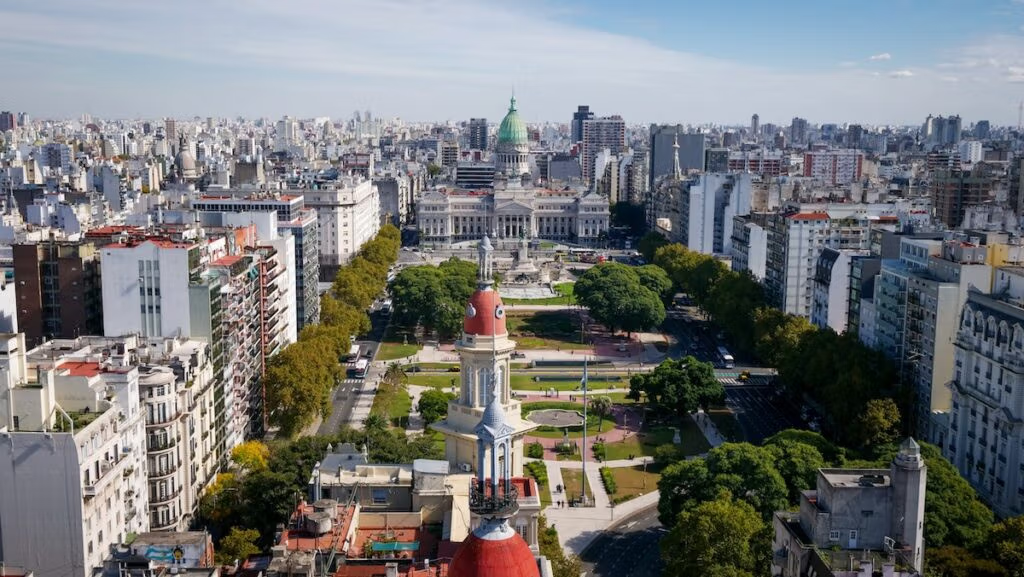
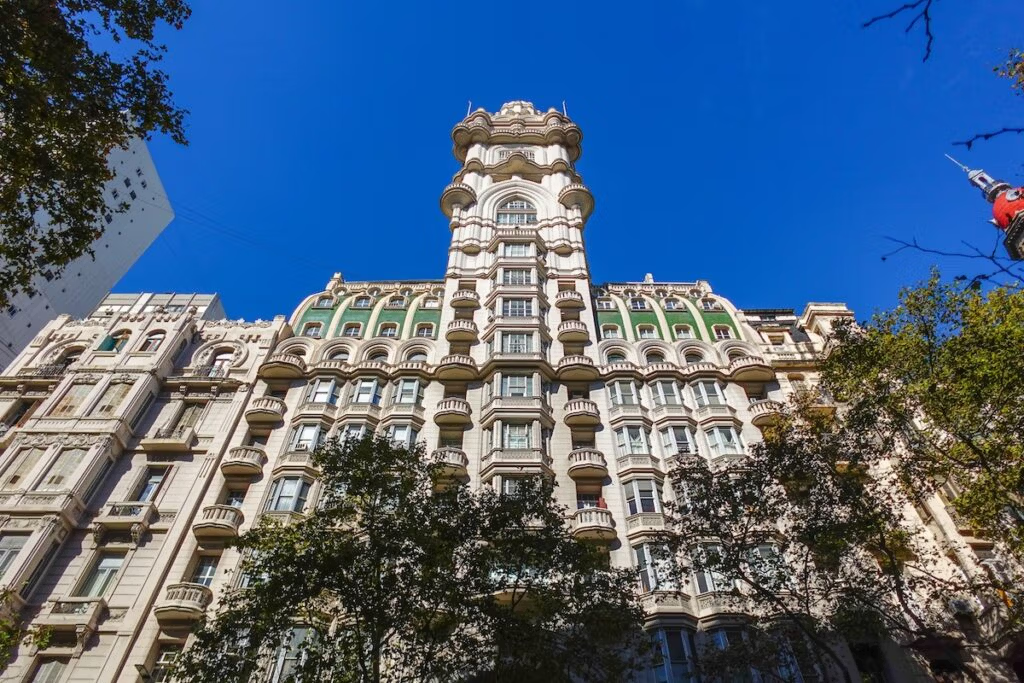
What to Do Nearby Congress
The Congress is located in the heart of Buenos Aires, so there’s plenty to explore before or after your tour:
- Aljibe Tango – In case you’re looking to watch an early tango show in Buenos Aires.
- Café Tortoni – A short stroll down Avenida de Mayo, this historic café has been serving porteños since 1858.
- El Imparcial – This bodegón is the oldest restaurant in Buenos Aires and they serve some delicious Spanish-style dishes. This is where I like to eat when I’m in the area!
- Palacio Barolo – Another Belle Époque gem just a few blocks away. Its lighthouse dome offers incredible city views. You can read all about my visit to Palacio Barolo here.
- Avenida de Mayo Walk – This grand avenue links the Congress to Plaza de Mayo. It’s lined with gorgeous buildings, making it one of the best architecture walks in the city.
If you want to do a bit more exploring, you can check out my Monserrat neighbourhood guide highlighting things to do, where to eat and where to stay.
And if you happen to be in the city on a day when it is pouring rain, here are some indoor activities you can enjoy across Buenos Aires.
National Congress of Argentina Visitor FAQs
Tours are free and spots are limited. Check the schedule on the official Senado and Diputados website, and arrive at the visitor entrance 30 minutes early with ID.
Tours run on weekdays, but the schedules shift with the legislative calendar and holidays. Always check the official site before your visit.
Yes. A valid passport or DNI is required for security screening. You will not enter without identification.
Most visits take 45–60 minutes, depending on chamber access and group size.
Tours are held in Spanish and English. Visitors will be divided into groups based on language.
Expect to see the Deputies Chamber, Senate Chamber, the Pink Room, the Blue Room, and other spaces.
Yes, photography is allowed. Avoid flash, respect signage inside chambers, and follow your guide’s instructions.
Dress smart-casual and travel light. Large bags are not permitted.
Yes. Tours will be cancelled or rerouted if sessions are in progress or during official events/strikes.
Take Subte Line A to Congreso or buses serving Plaza del Congreso. It’s also an easy walk along Avenida de Mayo from Plaza de Mayo.
